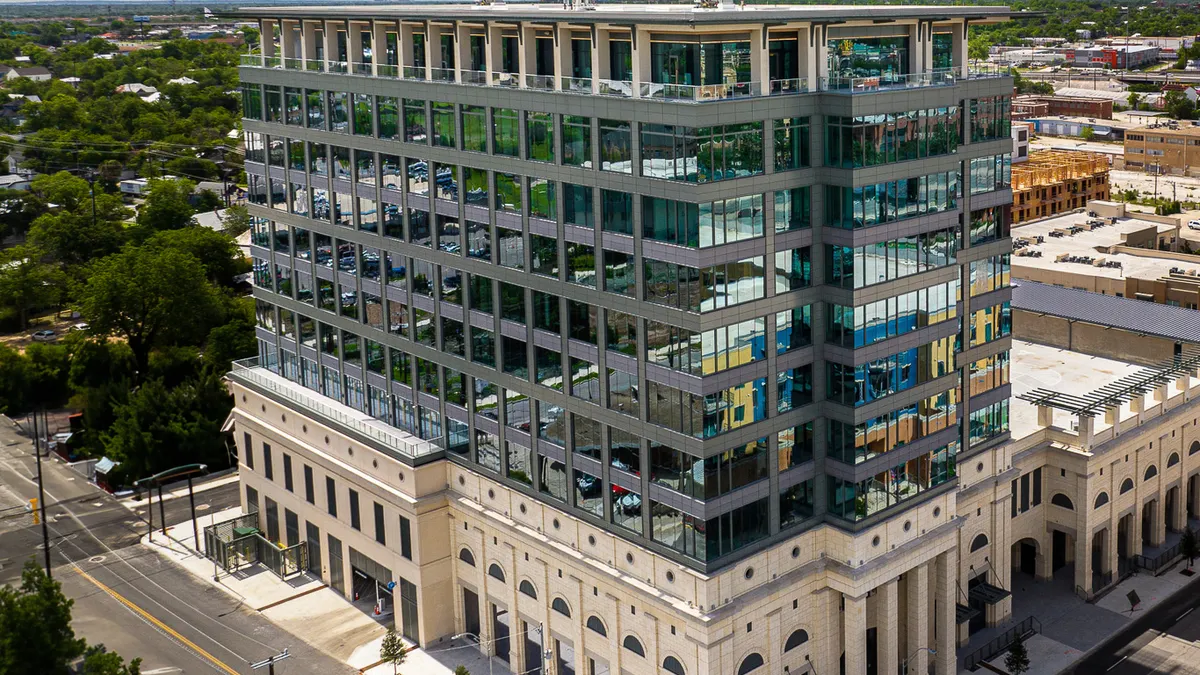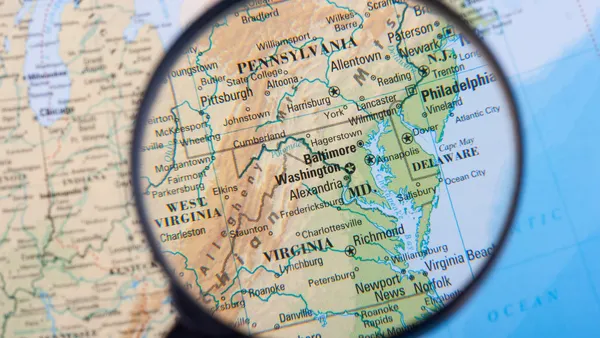Dive Brief:
- Treasury Secretary Steven Mnuchin asked congressional leaders Tuesday to vote to add $250 billion this week to the Small Business Administration’s already-$350 billion Paycheck Protection Program (PPP).
- Lenders have submitted about 265,000 applications for $71 billion in loans in the five days since the program launched, SBA officials said Tuesday.
- The application process has been fraught with delays, including a four-hour outage to the SBA’s loan processing system Monday and the need to comply with anti-money laundering regulations.
Dive Insight:
Demand for PPP loans prompted Sen. Marco Rubio, R-FL, to warn in a tweet Saturday — one day after launch — that the program would need more money by late May.
Mnuchin tweeted Tuesday that he had spoken to Republican and Democratic leaders in the House and Senate about adding $250 billion “to make sure small businesses get the money they need.”
“We look forward to the Senate passing that on Thursday and the House passing that on Friday,” Mnuchin said Tuesday as he and President Donald Trump met with bank executives, according to Bloomberg.
Republican leaders embraced the timeline. Senate Majority Leader Mitch McConnell, R-KY, said he aimed to pass the extra funds through his chamber Thursday. Meanwhile, House Minority Leader Kevin McCarthy, R-CA, tweeted, “Following the Senate’s approval, the House should move swiftly to do the same.”
Democrats, however, wanted to ensure some conditions are met — namely, according to The Washington Post, that a portion of the PPP funds be directed toward companies owned by women, minorities and veterans, as well as those in rural and underserved areas.
“We want to make sure that the program is administered in a way that does not solidify inequality in how people have access to capital, but instead [is a] benefit to everyone who qualifies for it,” House Speaker Nancy Pelosi, D-CA, told CNN.
PPP loans give businesses with fewer than 500 employees up to $10 million, which doesn’t need to be paid back if employers meet certain conditions, such as using 75% of the money to retain or rehire employees.
House Ways and Means Committee Chairman Richard E. Neal, D-MA, said he and other lawmakers pressed Mnuchin to expand the program to cover businesses with up to 1,000 employees. And, he told The Washington Post, they pushed for even more money.
“We urged him to go higher,” Neal said Democrats told Mnuchin. “You might need to get it up to a trillion.”
Senate Minority Leader Chuck Schumer, D-NY, proposed a separate stimulus package that would award hazard pay of up to $25,000 each for grocery store employees, transit workers, pharmacists and others who are working through the coronavirus outbreak, Bloomberg reported.
A survey released Tuesday by the Federal Reserve Bank of New York brought into focus the risks small businesses are facing during the coronavirus pandemic. Only 14% of companies surveyed said they had enough cash reserves to run as normal if they lost two months’ worth of revenue.
That makes persistent hiccups in the PPP rollout all the more frustrating for applicants.
Bank of America was the only systemically important U.S. bank to open its application portal Friday without significant delays. Small businesses had submitted 250,000 applications totaling $40 billion to the nation’s second-largest bank by Monday evening, according to Bloomberg. However, the bank’s stipulation, early in the process, that it would only accept applications from existing customers prompted a group of small-business owners to sue the bank Friday.
“This program was a lifeline,” Amy Elias, CEO and founder of the Baltimore public relations firm Profiles, told the Baltimore Sun. "It is not right that Bank of America gets to decide who sinks and who swims.”
Time may have been behind the bank prioritizing existing customers. The Financial Crimes Enforcement Network (FinCEN), which enforces anti-money laundering and anti-terrorism rules, requires banks to verify clients’ identities. For businesses, that means banks must check the identity of each person who owns more than 25% of the company, and any person that has control of its operations.
Industry analysts say obtaining these details can add 40 to 120 minutes to the application intake process. But verification can add up to 30 days depending on the complexity of the business’s ownership, Bloomberg reported.
“Small businesses and policy makers should understand that a primary reason most banks will be extending these loans only to existing customers is because the anti-money laundering process is so onerous and time-consuming,” said Greg Baer, president of the Bank Policy Institute.
FinCEN is “committed to promoting the success” of the new stimulus law, “including the need to facilitate expeditious disbursal” of funds, the agency said in a statement on its website. The agency plans to issue additional guidance as the law is rolled out and questions arise, the statement added.
Smaller banks, too, are saying they're left out of the application process.
An informal survey of community banks found that a third still lack access to the SBA system, Noah Wilcox, CEO of Grand Rapids State Bank and chairman of the Independent Community Bankers of America, told Trump during the White House call Tuesday, according to American Banker.
“Those community banks have been boxed out, unable to serve their communities and their customers,” Wilcox said.
Community banks aren't alone. Citi's portal was still not live by Wednesday morning.
"While we are working as quickly as we can, we are not yet able to accept applications for the Paycheck Protection Program,” the bank said on its website. “Our branch and call center representatives do not have any additional information at this time.”
Yet even when banks' portals were live, technical issues still plagued the process.
The SBA's loan processing system, E-Tran, was unavailable for up to four hours Monday, spurring Rubio to call it out as "a major problem.” Rubio, an architect of the PPP, said Monday he asked the SBA for its plan to improve access. “This MUST be corrected ASAP,” Rubio tweeted.
Dianna Seaborn, director of the SBA’s Office of Financial Assistance, asked lenders for patience.
“We appreciate there are frustrations,” Seaborn said, according to American Banker. “We’re flying the plane and building it at the same time. Things change hourly.”












